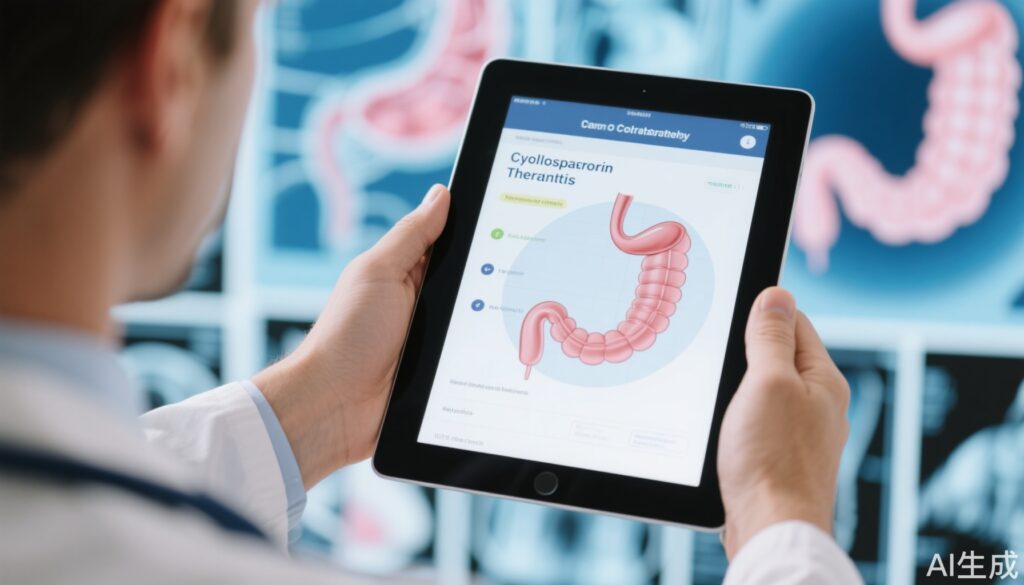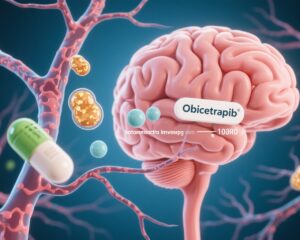Highlight
– Cyclosporin induces clinical response in 88% and remission in nearly 24% of adults with severe steroid-refractory ulcerative colitis after intravenous therapy.
– Oral cyclosporin maintains remission in approximately 40% of patients; concomitant immunomodulator therapy significantly enhances remission rates.
– More than half of the cyclosporin responders avoid colectomy, with colectomy-free survival rates declining gradually over 14 years.
– Adverse events occur in over half of patients, especially those with hypoalbuminaemia at therapy initiation.
Study Background and Disease Burden
Ulcerative colitis (UC) is a chronic inflammatory bowel disease characterized by mucosal inflammation of the colon, often resulting in debilitating symptoms and significantly impacting quality of life. Steroids are typically first-line therapy for moderate to severe flares. However, a subset of patients develop steroid-refractory UC, which is associated with poor clinical outcomes including a high risk of colectomy. While biologics provide additional options, there remains an unmet need for effective salvage therapies for patients failing corticosteroids. Cyclosporin, a calcineurin inhibitor with potent immunosuppressive effects, has been explored as a rescue treatment in severe steroid-refractory UC, but long-term efficacy and safety data have remained limited.
Study Design
This retrospective cohort study included 92 adult patients (mean age 55 years, 54.4% male) diagnosed with severe steroid-refractory ulcerative colitis between January 2001 and February 2024. All patients initially received intravenous methylprednisolone (1 mg/kg/day for 3–7 days). Patients who failed to respond subsequently received intravenous cyclosporin (median dose 3 mg/kg/day for 5–7 days) as second- or third-line rescue therapy. Disease activity was assessed using Mayo endoscopic subscore and partial Mayo score (pMayo).
The primary endpoint was clinical response and remission following intravenous cyclosporin. Clinical response was defined as any reduction from baseline pMayo score, and remission was pMayo ≤ 2 with a rectal bleeding subscore of zero. Patients demonstrating clinical response transitioned to oral cyclosporin therapy. Secondary outcomes included relapse rates during oral therapy, adverse event frequency, and long-term colectomy-free survival with a median follow-up of 14 years.
Key Findings
Intravenous cyclosporin induced clinical response in 88% (81/92) of patients and remission in 23.9% (22/92). Logistic regression found no predictors for response to IV cyclosporin.
During oral cyclosporin maintenance (mean 9.0 ± 11.5 months, median 5 months), relapse occurred in 41.9% (34/81), while 40.7% (33/81) achieved or maintained remission. Multivariable analysis identified concomitant immunomodulator therapy (IMT) as the only significant predictor of remission (OR 6.41; 95% CI 1.92–21.36; p=0.002).
Cyclosporin was discontinued in 12% due to insufficient IV response and 14.1% owing to adverse events, which were reported in 53.3% overall. Hypoalbuminaemia (serum albumin <35 g/L) at initiation predicted adverse events (OR 0.36; P=0.03).
After cyclosporin initiation, colectomy-free survival rates at 1, 3, 5, and 14 years were 74.7%, 62.6%, 57.1%, and 45.6%, respectively. Half (50%) of the total cohort and 51.9% of responders avoided colectomy during follow-up.
Expert Commentary
This study reinforces cyclosporin as an effective rescue therapy in severe steroid-refractory UC with durable responses enabling many patients to avoid colectomy in the long term. The high initial response rate aligns with prior reports, but the notable relapse during oral maintenance highlights the need for optimizing sustained remission strategies.
Importantly, the identification of immunomodulator therapy as a positive predictor for remission suggests a synergistic effect of combination immunosuppression. This supports existing practice frameworks recommending adjunct immunomodulators to enhance and maintain cyclosporin efficacy.
Adverse events remain a significant concern, emphasizing the necessity for careful patient selection and monitoring, particularly in those with hypoalbuminaemia which may signal vulnerability.
Limitations include the retrospective design and lack of comparator groups such as biologic therapies. Prospective randomized trials would be beneficial to further delineate cyclosporin’s precise role compared to newer agents.
Conclusion
Cyclosporin is a valuable rescue option for adults with severe steroid-refractory ulcerative colitis, achieving substantial clinical response and remission rates. Incorporation of concomitant immunomodulator therapy enhances remission and colectomy avoidance. Despite frequent adverse events, cyclosporin offers a meaningful alternative to surgery for many patients. Careful patient selection and monitoring are paramount to optimize outcomes. Further prospective studies are warranted to refine therapeutic algorithms integrating cyclosporin with modern treatment strategies.
References
Farkas B, Bacsur P, Bálint A, Ivány E, Rutka M, Fábián A, Bősze Z, Bor R, Szepes Z, Farkas K, Molnár T. Short- and longevity outcome of cyclosporin rescue therapy in severe ulcerative colitis refractory to intravenous corticosteroid treatment. Therap Adv Gastroenterol. 2025 Aug 8;18:17562848251361054. doi: 10.1177/17562848251361054. PMID: 40785797; PMCID: PMC12334824.


